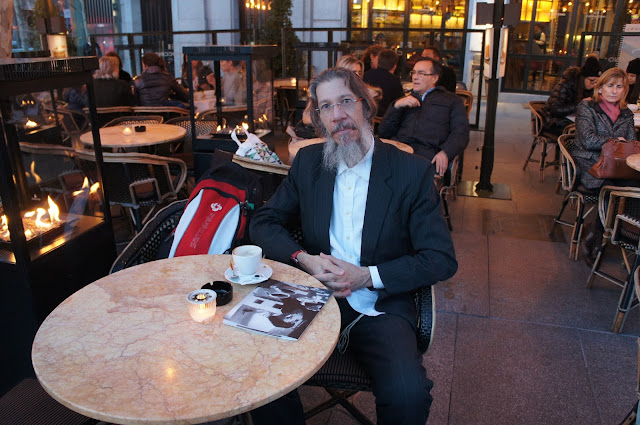JACOB JR, MY JEWISH WORLD. SAMSON RAPHAEL HIRSCH AND THE ORTHODOX JUDAISM
 |
| RASHI SYNAGOGUE, WORMS/GERMANY |
Yom Rev'i, Nissan 5, 5776. Wednsday, April 13, 2016.
Samson Raphael Hirsch and the Orthodoxy
Samson Raphael Hirsch (Hamburg/Germany- 1808-88), the foremost intellectual proponent of what is now labeled Orthodox Judaism, denies exactly what Geiger affirms: that Judaism and Jewish law in particular are subject to historical change, and that Judaism is a religion. As Hirsch puts it in his response to the reformers: "Its only because 'religion' does not mean to you the word of G'd, because in your heart you deny Divine Revelation, because you believe not in Revelation given to man but in revelation from man, that you can give man the right to lay down conditions to religion." Judaism and Jewish law are "an untouchable sanctuary which must not be subjected to human judgment nor subordinated to human considerations."
 Hirsch observes that; Judaism is not a religion, the synagogue is not a church, and the Rabbi is not a priest. Judaism is not a mere adjunct to life: it comprises all of life. To be a Jew is not a mere part, it is the sum total of our task in life. To be a Jew in a synagogue and the kitchen, in the field and the warehouse, in the office and the pulpit, as father and mother, as servant and master, as man and citizen, with one's thought, in word and in deed, in enjoyment and privation, with the needle and the graving-tool, with the pen and the chisel - that is what it means to be a Jew. An entire life supported by the Divine idea and lived and brought to fulfillment according to divine will.
Hirsch observes that; Judaism is not a religion, the synagogue is not a church, and the Rabbi is not a priest. Judaism is not a mere adjunct to life: it comprises all of life. To be a Jew is not a mere part, it is the sum total of our task in life. To be a Jew in a synagogue and the kitchen, in the field and the warehouse, in the office and the pulpit, as father and mother, as servant and master, as man and citizen, with one's thought, in word and in deed, in enjoyment and privation, with the needle and the graving-tool, with the pen and the chisel - that is what it means to be a Jew. An entire life supported by the Divine idea and lived and brought to fulfillment according to divine will.
Hirsch also reiterates Geoger's claim that Judaism concerns spiritual and not political matters in his affirmation of Orthodox Judaism's relations to civil society: "It is precisely the purely spiritual nature of Israel's nationhood that makes it possible for Jews everywhere to tie themselves fully to the various states in which they live."
Hirsch in fact established the modern phenomenon of Jewish sectarianism by highlighting the necessity of correct belief. Based onn his conception of genuine Jew and the true Jewish congregation made up of such individuals, he petitioned for Prussian bill, eventually passed in 1876, that allowed Orthodox Jews to establish a separate community by seceding from the Jewish community recognized by the state. To defend his separatist stance toward non-Orthodox Jews, Hirsch transforms what had been simultaneously a Jewish political and theological conceptheresy - into a purely theological caategory by separating heresy from the heretic. The heresy that most concerns Hirsch is not related to the pratice of Judaism but rather to Jewish belief, and specifically the belief that "the law, both written and oral, was closed with Moses at Sinai." This belief becomes, with Hirsch, the religious dogma that still defines Modern Orthodoxy.
Voluntary belief, as opposed to political identity, defines what Hirsch calls the genuine Jew, he justifies his distinction between heresy and heretics by implying that the relation between Orthodox Jews and non-Orthodox Jews is not different than the relation between Jews and non-Jews: "Even the most stringently observant Jew is free to maintain contacts and friendly relations with individuals adhering to the most diverse assorment of religious persuasions: christians, moslems, heathens."
 Hirsch observes that; Judaism is not a religion, the synagogue is not a church, and the Rabbi is not a priest. Judaism is not a mere adjunct to life: it comprises all of life. To be a Jew is not a mere part, it is the sum total of our task in life. To be a Jew in a synagogue and the kitchen, in the field and the warehouse, in the office and the pulpit, as father and mother, as servant and master, as man and citizen, with one's thought, in word and in deed, in enjoyment and privation, with the needle and the graving-tool, with the pen and the chisel - that is what it means to be a Jew. An entire life supported by the Divine idea and lived and brought to fulfillment according to divine will.
Hirsch observes that; Judaism is not a religion, the synagogue is not a church, and the Rabbi is not a priest. Judaism is not a mere adjunct to life: it comprises all of life. To be a Jew is not a mere part, it is the sum total of our task in life. To be a Jew in a synagogue and the kitchen, in the field and the warehouse, in the office and the pulpit, as father and mother, as servant and master, as man and citizen, with one's thought, in word and in deed, in enjoyment and privation, with the needle and the graving-tool, with the pen and the chisel - that is what it means to be a Jew. An entire life supported by the Divine idea and lived and brought to fulfillment according to divine will.Hirsch also reiterates Geoger's claim that Judaism concerns spiritual and not political matters in his affirmation of Orthodox Judaism's relations to civil society: "It is precisely the purely spiritual nature of Israel's nationhood that makes it possible for Jews everywhere to tie themselves fully to the various states in which they live."
Hirsch in fact established the modern phenomenon of Jewish sectarianism by highlighting the necessity of correct belief. Based onn his conception of genuine Jew and the true Jewish congregation made up of such individuals, he petitioned for Prussian bill, eventually passed in 1876, that allowed Orthodox Jews to establish a separate community by seceding from the Jewish community recognized by the state. To defend his separatist stance toward non-Orthodox Jews, Hirsch transforms what had been simultaneously a Jewish political and theological conceptheresy - into a purely theological caategory by separating heresy from the heretic. The heresy that most concerns Hirsch is not related to the pratice of Judaism but rather to Jewish belief, and specifically the belief that "the law, both written and oral, was closed with Moses at Sinai." This belief becomes, with Hirsch, the religious dogma that still defines Modern Orthodoxy.
Voluntary belief, as opposed to political identity, defines what Hirsch calls the genuine Jew, he justifies his distinction between heresy and heretics by implying that the relation between Orthodox Jews and non-Orthodox Jews is not different than the relation between Jews and non-Jews: "Even the most stringently observant Jew is free to maintain contacts and friendly relations with individuals adhering to the most diverse assorment of religious persuasions: christians, moslems, heathens."
Shalom! Aleichem.
Cultural Support: Jacob Jr. B.A.C.E., avec L'Integration d'Association avec Israel et dans le Monde/Cz .



Comments
Post a Comment